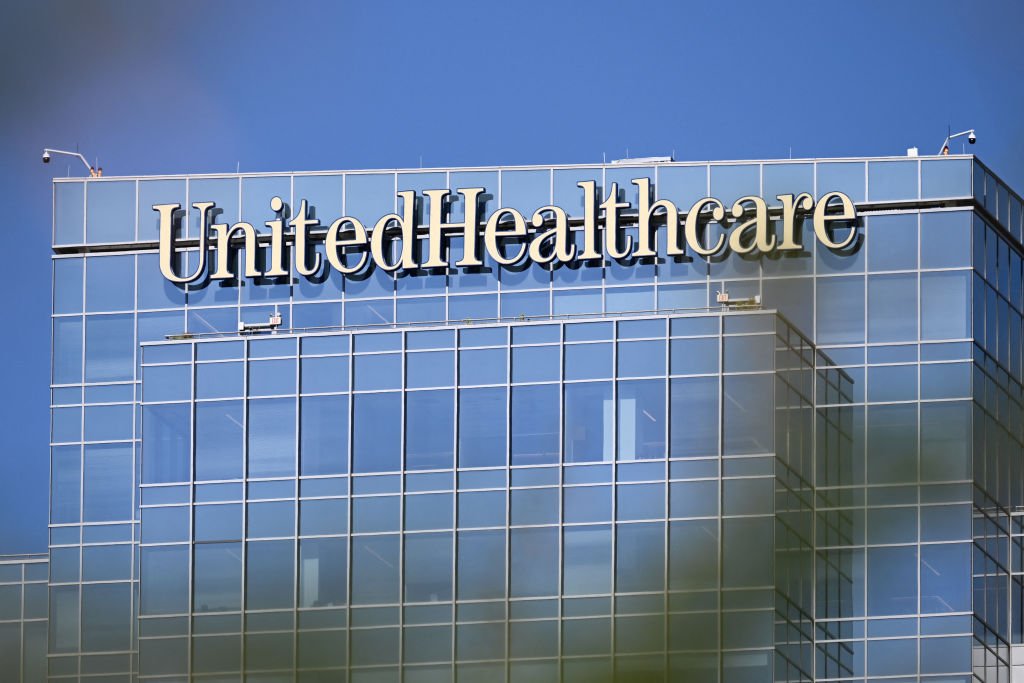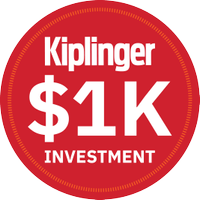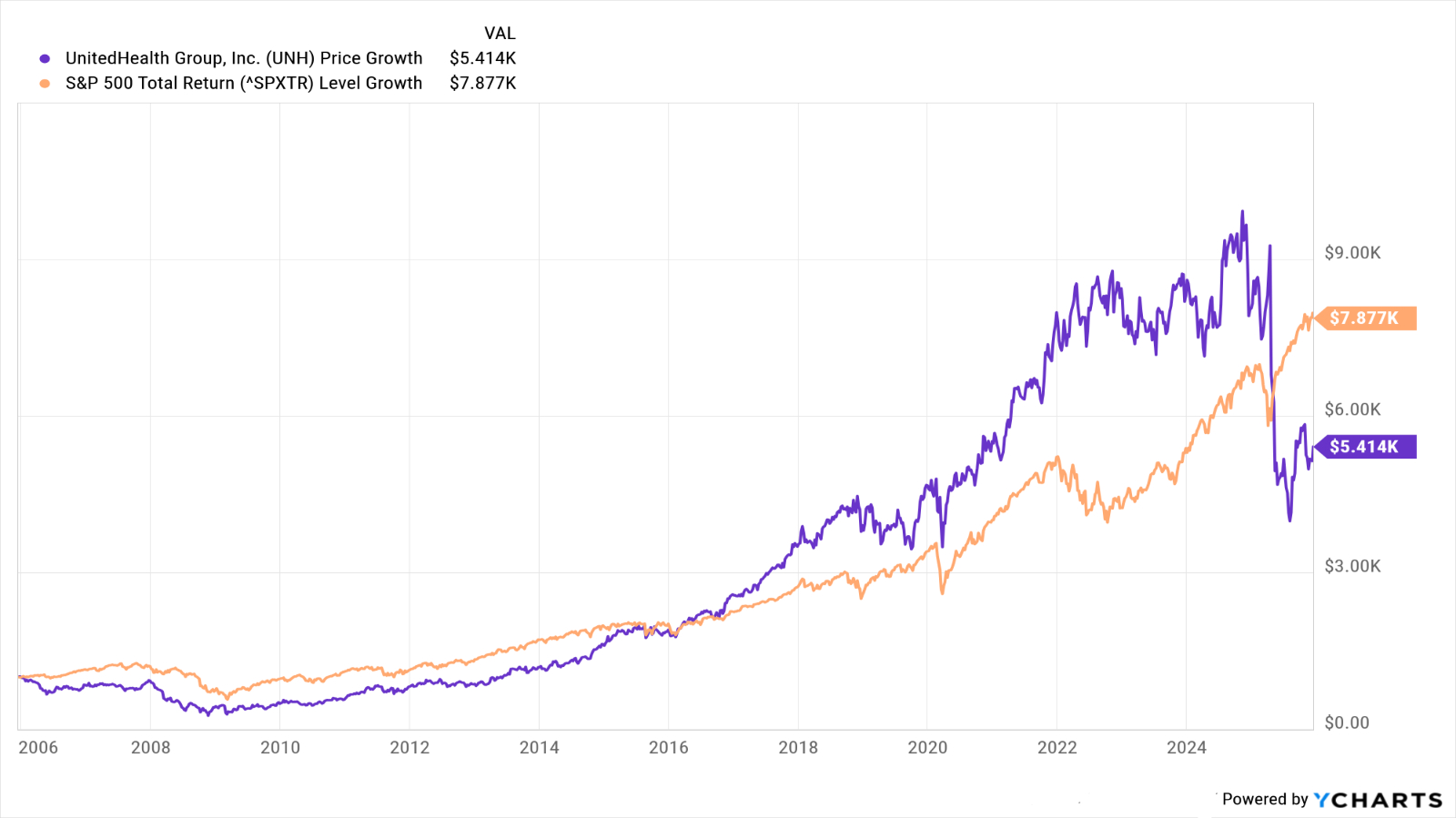If You'd Put $1,000 Into UnitedHealth Group Stock 20 Years Ago, Here's What You'd Have Today
UNH stock was a massive market beater for ages — until it wasn't.



Profit and prosper with the best of Kiplinger's advice on investing, taxes, retirement, personal finance and much more. Delivered daily. Enter your email in the box and click Sign Me Up.
You are now subscribed
Your newsletter sign-up was successful
Want to add more newsletters?

Delivered daily
Kiplinger Today
Profit and prosper with the best of Kiplinger's advice on investing, taxes, retirement, personal finance and much more delivered daily. Smart money moves start here.

Sent five days a week
Kiplinger A Step Ahead
Get practical help to make better financial decisions in your everyday life, from spending to savings on top deals.

Delivered daily
Kiplinger Closing Bell
Get today's biggest financial and investing headlines delivered to your inbox every day the U.S. stock market is open.

Sent twice a week
Kiplinger Adviser Intel
Financial pros across the country share best practices and fresh tactics to preserve and grow your wealth.

Delivered weekly
Kiplinger Tax Tips
Trim your federal and state tax bills with practical tax-planning and tax-cutting strategies.

Sent twice a week
Kiplinger Retirement Tips
Your twice-a-week guide to planning and enjoying a financially secure and richly rewarding retirement

Sent bimonthly.
Kiplinger Adviser Angle
Insights for advisers, wealth managers and other financial professionals.

Sent twice a week
Kiplinger Investing Weekly
Your twice-a-week roundup of promising stocks, funds, companies and industries you should consider, ones you should avoid, and why.

Sent weekly for six weeks
Kiplinger Invest for Retirement
Your step-by-step six-part series on how to invest for retirement, from devising a successful strategy to exactly which investments to choose.
UnitedHealth Group (UNH) was a long-time market beater in a big way before 2025 became its annus horribilis.
Shares in the nation's largest health insurer had been a great buy-and-hold bet for decades, thanks to a relentless focus on growth through acquisitions.
The company, which started with humble beginnings in the 1970s, was a pioneer in offering network-based health care plans with the aim of controlling costs.
From just $107.88 $24.99 for Kiplinger Personal Finance
Become a smarter, better informed investor. Subscribe from just $107.88 $24.99, plus get up to 4 Special Issues

Sign up for Kiplinger’s Free Newsletters
Profit and prosper with the best of expert advice on investing, taxes, retirement, personal finance and more - straight to your e-mail.
Profit and prosper with the best of expert advice - straight to your e-mail.
A few decades later, scores of acquisitions gave UNH an essentially vertical portfolio of health care businesses. By 2012, the company was such a force in its sector that the stock was added to the Dow Jones Industrial Average.
Today, UNH provides health insurance benefits to more than 50 million people. Its non-insurance Optum business, which helped drive much of the Dow Jones stock's upside in recent decades, is one of the largest employers of physicians in the U.S.
With a portfolio of businesses including insurance, pharmacy benefits management, doctor practices, medical billing and more, UnitedHealth became a growth darling in a defensive sector.
In 2024, UNH reported revenue of more than $400 billion, or a 100% increase over the $200 billion in revenue the company booked in 2017. Apple (AAPL), by comparison, saw its top line rise 70% to $391 billion over the same span.
Even more important, UNH maintained its ability to generate strong and steady profit growth. Operating earnings grew at an average rate of nearly 18% year over year as it doubled its revenue.
Investors were rewarded handsomely. Shares in UNH beat the broader market, often by wide margins, in both good years and bad. In 2021, when the S&P 500 returned 29% including dividends, UNH returned 45%. The following year, when the market lost 18%, UNH was up 7%.
Then things went awry.
The bottom line on UNH stock?
UNH was cruising along with long-term market-crushing returns until seemingly everything went sideways starting in late 2024: rising Medicare costs, a Department of Justice investigation into its billing practices and the murder of an executive.
Shares lost more than half their value at one point in 2025 and remained down about 40% through the first eight months of the year. A company with a peak market cap of $575 billion as recently as November 2024 is now worth about $340 billion.
Put another way, UNH has lost $235 billion in value from its top — or more than the entire market cap of McDonald's (MCD).
True, Berkshire Hathaway's (BRK.B) Warren Buffett spied a bargain in UNH. The chairman and CEO, who will step down at the end of the year, added the troubled insurer to the Berkshire Hathaway equity portfolio in the second quarter.
In addition to a depressed share price, Buffett was also likely attracted to UNH's dividend. At 2.6%, UNH yields more than double the S&P 500.
Buffett scooping up 5 million shares in UNH might have given existing shareholders a boost of confidence, but it might take a good long while for their own positions to recover. As you can see in the chart below, UNH's deep funk has ruined its long-term returns.

Over its entire life as a publicly traded company, UNH generated an annualized total return (price change plus dividends) of 18%. That beats the broader market by a wide margin, or nearly 8 percentage points.
Sadly, that's about the only time frame that makes UNH look good. Shares have now underperformed the S&P 500 over every standardized period except 15 years. As for the past two decades, UNH's return of 10.2% lags the S&P 500 by almost a percentage point.
In other words, if you put $1,000 into UnitedHealth stock 20 years ago, it would today be worth just $5,400. The same sum invested in the S&P 500 would theoretically be worth almost $7,900 today.
UNH was a massive market beater for ages — until it wasn't.
That hardly means the stock can't come back. Indeed, Buffett isn't the only one bullish on its prospects. Of the 27 analysts covering UNH tracked by S&P Global Market Intelligence, 13 call it a Strong Buy, six say Buy, six have it at Hold and two rate it at Strong Sell.
That works out to a consensus recommendation of Buy, with solid conviction.
More Stocks of the Past 20 Years
- If You'd Put $1,000 Into Netflix Stock 20 Years Ago, Here's What You'd Have Today
- If You'd Put $1,000 Into Microsoft Stock 20 Years Ago, Here's What You'd Have Today
- If You'd Put $1,000 Into Apple Stock 20 Years Ago, Here's What You'd Have Today
Profit and prosper with the best of Kiplinger's advice on investing, taxes, retirement, personal finance and much more. Delivered daily. Enter your email in the box and click Sign Me Up.

Dan Burrows is Kiplinger's senior investing writer, having joined the publication full time in 2016.
A long-time financial journalist, Dan is a veteran of MarketWatch, CBS MoneyWatch, SmartMoney, InvestorPlace, DailyFinance and other tier 1 national publications. He has written for The Wall Street Journal, Bloomberg and Consumer Reports and his stories have appeared in the New York Daily News, the San Jose Mercury News and Investor's Business Daily, among many other outlets. As a senior writer at AOL's DailyFinance, Dan reported market news from the floor of the New York Stock Exchange.
Once upon a time – before his days as a financial reporter and assistant financial editor at legendary fashion trade paper Women's Wear Daily – Dan worked for Spy magazine, scribbled away at Time Inc. and contributed to Maxim magazine back when lad mags were a thing. He's also written for Esquire magazine's Dubious Achievements Awards.
In his current role at Kiplinger, Dan writes about markets and macroeconomics.
Dan holds a bachelor's degree from Oberlin College and a master's degree from Columbia University.
Disclosure: Dan does not trade individual stocks or securities. He is eternally long the U.S equity market, primarily through tax-advantaged accounts.
-
 Nasdaq Leads a Rocky Risk-On Rally: Stock Market Today
Nasdaq Leads a Rocky Risk-On Rally: Stock Market TodayAnother worrying bout of late-session weakness couldn't take down the main equity indexes on Wednesday.
-
 Quiz: Do You Know How to Avoid the "Medigap Trap?"
Quiz: Do You Know How to Avoid the "Medigap Trap?"Quiz Test your basic knowledge of the "Medigap Trap" in our quick quiz.
-
 5 Top Tax-Efficient Mutual Funds for Smarter Investing
5 Top Tax-Efficient Mutual Funds for Smarter InvestingMutual funds are many things, but "tax-friendly" usually isn't one of them. These are the exceptions.
-
 Nasdaq Leads a Rocky Risk-On Rally: Stock Market Today
Nasdaq Leads a Rocky Risk-On Rally: Stock Market TodayAnother worrying bout of late-session weakness couldn't take down the main equity indexes on Wednesday.
-
 5 Top Tax-Efficient Mutual Funds for Smarter Investing
5 Top Tax-Efficient Mutual Funds for Smarter InvestingMutual funds are many things, but "tax-friendly" usually isn't one of them. These are the exceptions.
-
 Why Invest In Mutual Funds When ETFs Exist?
Why Invest In Mutual Funds When ETFs Exist?Exchange-traded funds are cheaper, more tax-efficient and more flexible. But don't put mutual funds out to pasture quite yet.
-
 Social Security Break-Even Math Is Helpful, But Don't Let It Dictate When You'll File
Social Security Break-Even Math Is Helpful, But Don't Let It Dictate When You'll FileYour Social Security break-even age tells you how long you'd need to live for delaying to pay off, but shouldn't be the sole basis for deciding when to claim.
-
 I'm an Opportunity Zone Pro: This Is How to Deliver Roth-Like Tax-Free Growth (Without Contribution Limits)
I'm an Opportunity Zone Pro: This Is How to Deliver Roth-Like Tax-Free Growth (Without Contribution Limits)Investors who combine Roth IRAs, the gold standard of tax-free savings, with qualified opportunity funds could enjoy decades of tax-free growth.
-
 One of the Most Powerful Wealth-Building Moves a Woman Can Make: A Midcareer Pivot
One of the Most Powerful Wealth-Building Moves a Woman Can Make: A Midcareer PivotIf it feels like you can't sustain what you're doing for the next 20 years, it's time for an honest look at what's draining you and what energizes you.
-
 Stocks Make More Big Up and Down Moves: Stock Market Today
Stocks Make More Big Up and Down Moves: Stock Market TodayThe impact of revolutionary technology has replaced world-changing trade policy as the major variable for markets, with mixed results for sectors and stocks.
-
 I'm a Wealth Adviser Obsessed With Mahjong: Here Are 8 Ways It Can Teach Us How to Manage Our Money
I'm a Wealth Adviser Obsessed With Mahjong: Here Are 8 Ways It Can Teach Us How to Manage Our MoneyThis increasingly popular Chinese game can teach us not only how to help manage our money but also how important it is to connect with other people.